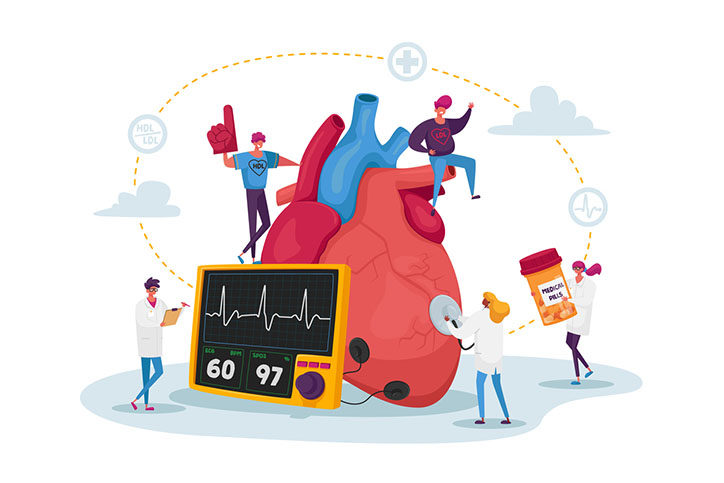Cardiovascular (heart) medicines are used to treat diseases of the heart and high blood pressure. According to the Centers for Disease Control and Prevention (CDC), one of the most common prescription drugs taken by adults are for cardiovascular disease. The CDC found that 17.7 percent of adults aged 18-64 took at least one cardiovascular medicine in the past 30 days. For older adults aged 65 and over, the number jumps to 70.2 percent taking at least one cardiovascular medicine in the past 30 days! Safe to say, a lot of people are prescribed this kind of medicine. We often hear about them in cases managed here at the Maryland Poison Center (MPC). Let’s look at the different types of cardiovascular medicines and how we can take them safely.
Types of Cardiovascular Medicines
Anticoagulant – commonly known as blood thinners. This type of medicine helps slow the body’s process for making blood clots. Blood clots can cause stroke, pulmonary embolism (blood clot in the lung), and heart attack. Common prescriptions include Warfarin (Coumadin), Apixaban (Eliquis), and Heparin.
Antiplatelet – prevents blood platelets from sticking together, ultimately keeping blood clots from forming. Aspirin, an over-the-counter medicine, is the most commonly used antiplatelet, but others include prescription medicines such as Clopidogrel (Plavix) and Prasugrel (Effient).
ACE Inhibitors – ACE stands for angiotensin-converting enzyme. This type of medicine treats high blood pressure and heart failure. It works by relaxing the veins and arteries to lower blood pressure. Common prescriptions include Benazepril (Lotensin), Captopril, and Enalapril (Vasotec).
Angiotensin II Receptor Blockers – relaxes your veins and arteries to prevent blood pressure from rising. Angiotensin is a chemical in your body that narrows your blood vessels, so when you take this type of medicine it allows your veins and arteries to widen, making your blood pressure lower. Common prescriptions include Azilsartan (Edarbi), Candesartan (Antacand), and Eprosartan.
Beta Blockers – reduces the heart rate and the workload of the heart, which lowers your blood pressure. They can also be prescribed to help with other health issues such as migraines and certain types of tremors. Common prescriptions include Metoprolol (Lopressor) and Propranolol (Inderal).
Calcium Channel Blockers – lowers blood pressure by preventing calcium from entering the cells of the heart and arteries. Blocking calcium allows the blood vessels to relax and open. They are made for both short-acting and long-acting forms. Common prescriptions include Amlodipine (Norvasc), Felodipine, and Verapamil (Calan SR).
Cholesterol-Lowering Medicines – used to lower low-density lipoprotein (LDL) cholesterol levels. Having a high LDL cholesterol level can increase risk for heart disease and stroke. Cholesterol creates plaques in the arteries, causing them to be narrower. When arteries are narrow, less blood can flow through them. Common prescriptions include Atorvastatin (Lipitor) and Rosuvasatin (Crestor).
Diuretics – sometimes called water pills, these help rid your body of sodium (salt) and water. They do this by helping your kidneys release more sodium into your urine. The sodium helps remove water in your blood. If there is less fluid in your veins and arteries, your blood pressure will go down. Common prescriptions include Furosemide (Lasix) and Hydro-chlorothiazide (Hydrodiuril).
Vasodilators – relaxes blood vessels and decreases blood pressure. They relax muscles in the walls of the arteries and veins to prevent them from tightening so that blood can flow easily. Common prescriptions include Isosorbide mononitrate (Imdur) and Minoxidil.
Safely Taking Cardiovascular Medicines
- Always take the medicine as prescribed. You can find the instructions on the label of your prescription.
- Talk to your health care provider if you feel you want to stop taking the medicine. It may need to be gradually stopped.
- Ask your health care provider or pharmacist about possible drug or food interactions.
- Call the poison center if you think you may have taken the wrong dose or a double dose. Some medicines won’t cause any harm if taken twice, while others may.
- Store medicines up, away, and out of sight. These medicines can cause harm to someone who isn’t prescribed to take them.
- If you are experiencing side effects, our pharmacists and nurses are here to help.
If you took a cardiovascular medicine that wasn’t meant for you, took the wrong amount, or have other questions, call a poison specialist at 1-800-222-1222. We are available 24/7/365 and calling is free and confidential.





Leave a Reply